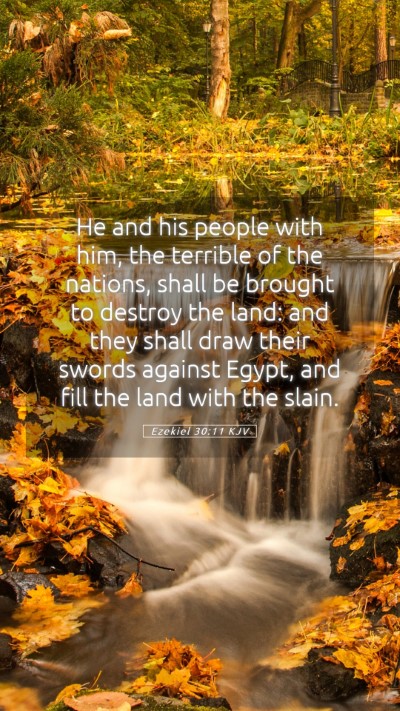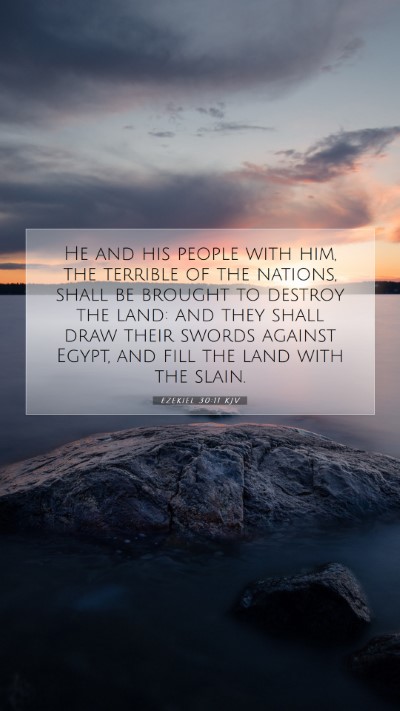Bible Verse Meaning: Ezekiel 30:11
Verse: "He and his people with him, the terrible of the nations, shall be brought to destroy the land: and they shall draw their swords against Egypt, and fill the land with the slain." (Ezekiel 30:11)
Summary of Interpretations
The verse Ezekiel 30:11 is a prophetic declaration concerning the judgment of Egypt by Nebuchadnezzar, the King of Babylon. This passage exemplifies God's sovereignty in enacting judgment upon nations that turn away from Him. The verse illustrates the themes of divine judgment and the execution of God's plans through chosen instruments such as Babylon.
Key Themes in Ezekiel 30:11
- Divine Judgment: Reflects God's authority and the ultimate accountability of nations.
- Instruments of Judgment: Nebuchadnezzar, described as 'the terrible of the nations', serves as a tool for God's wrath.
- Ezekiel's Prophetic Role: Highlights the role of the prophet as a messenger of dire warnings and prophecies.
Bible Verse Commentary
This passage can be understood through the lenses of several public domain commentaries:
Matthew Henry's Commentary
Matthew Henry interprets this verse as a clear indication of the outrage and destruction that God will unleash upon Egypt through the agency of Babylon. Henry emphasizes that Babylon's military might under Nebuchadnezzar will suffice to fulfill God's purpose in punishing Egypt for its idolatry and rebellion. This punishment serves as a warning to others about the repercussions of turning away from God.
Albert Barnes' Notes on the Bible
Albert Barnes provides a detailed analysis of the symbolism inherent in the term 'the terrible of the nations'. He argues that this phrase succinctly captures the fear and dread associated with Babylonian forces. Furthermore, he explains the broader implications of this judgment: it's not merely about conquest but ultimately about the realization of God's word being fulfilled amid nations that challenge His authority.
Adam Clarke's Commentary
Adam Clarke focuses on the historical context surrounding the destruction of Egypt. He elaborates on how this prophecy of destruction serves dual purposes: it highlights the inevitable fall of powerful nations that oppose God's will and reinforces the overall theme of divine retribution present in both the prophetic messages of the Old Testament and the experiences of God's covenant people.
Understanding Scripture
Understanding Ezekiel 30:11 involves recognizing its place within the larger narrative of the prophetic literature in the Bible. It is part of a series of oracles against various nations, emphasizing God's jurisdiction over all nations and the intricate relationship between divine sovereignty and human history.
Historical Context
This prophecy comes at a time when the Israelites were exiled and facing the consequences of their disobedience against God. The destruction prophesied against Egypt serves as both a judgment against their sins and a message of hope for Israel that God will ultimately prevail.
Application of the Verse
Applying the lessons of Ezekiel 30:11 to modern life encourages individuals and groups to reflect on the importance of aligning their lives with God's will. It serves as a reminder of the consequences of turning away from divine principles and urges believers to pursue righteousness and justice in their daily conduct.
Related Bible Cross References
- Jeremiah 46:25-26: A related prophecy focusing on Egypt's downfall.
- Ezekiel 29:17-21: Earlier prophecies detailing Egypt's punishment.
- Isaiah 19:1-17: Prophecies concerning Egypt's chaotic fate.
- Revelation 16:12: God's judgment upon nations in the apocalyptic vision.
Conclusion
In understanding Ezekiel 30:11, we uncover fundamental truths about God's nature, His governance over nations, and the implications of His justice. This verse not only forecasts a historical event but resonates deeply with the recurring theme of accountability that stretches throughout the entire biblical narrative.


